According to PwC, the hospitality industry is the one that can charge the second-highest premium for excellent customer experience with a 14% premium margin.1 Fast and easy-to-engage digital channels are part of the excellent customer experience.
Engaging with many customers 7/24 via live agents is not an efficient strategy for the hotels. Therefore, they can leverage their customer service with hospitality chatbots. Nevertheless, many hotels still do not use chatbots.
This article aims to make hotel managers reconsider their investment strategies regarding hospitality chatbots. In this regard, we introduce:
- Types
- Benefits
- And use cases of hospitality chatbots.
What is a hospitality chatbot?
Hospitality chatbots (sometimes referred to as hotel chatbots) are conversational AI-driven computer programs designed to simulate human conversation. By responding to customer queries that would otherwise be handled by human staff, hotel chatbots can reduce cost of customer engagement and enhance the client experience.
Which communication channels can hotels deploy chatbots?
Hospitality chatbots can be deployed on different channels such as:
- Messaging apps: As part of firms’ conversational commerce strategies, messaging apps are trending mediums for deploying chatbots. Especially after the launch of WhatsApp Business API. Hotel chains deploy WhatsApp chatbots.
- Custom mobile apps: As more people use smartphones, custom mobile apps become an important communication channel for many businesses. Hotels are not exempt from this customization and deploy chatbots on their apps.
- Hotel chains’ websites: Websites are another option that hotels frequently build chatbots.
What are the types of hotel chatbots?
There are two types of hospitality chatbots which are:
- Rule-based chatbots: These chatbots provide predetermined answers for certain questions. Since they cannot understand user intent, they are suitable for automating frequently asked questions. The main advantages of rule-based chatbots are their relatively easy deployment and lower price compared to AI chatbots.
- AI chatbots: These chatbots can handle more sophisticated customer queries for hotels thanks to their NLP–NLU capabilities. For instance, AI-driven chatbots can make bookings for customers. AI chatbots cons’ on the other hand are the greater time and cost needed for deployment.
Top benefits of hospitality chatbots
Work around the clock
According to Deloitte, one of the most important metrics customers use to assess the effectiveness of customer service is the length of time it takes to resolve a query (see Figure 2). Response times can be crucial in the hotel industry, as customers may engage with hotels from all time zones possible. This problem can be mitigated by hotel chatbots since they never:
- Tire
- Need to sleep
- Feel hunger
- Feel boredom etc.
Therefore, hotel chatbots can provide 24/7 customer service.
Figure 2: What modern customers expect from customer services.
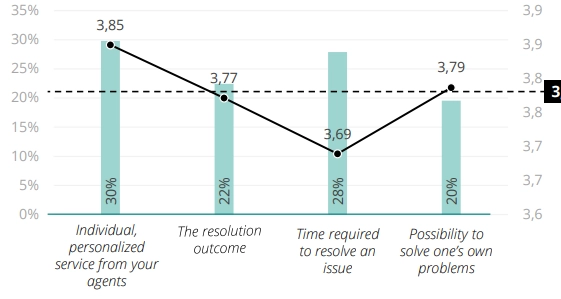
Multi-language support
You may offer support for a variety of languages whether you utilize an AI-based or rule-based hospitality chatbot. Because clients travel from all over the world and it is unlikely that hotels will be able to afford to hire employees with the requisite translation skills, this can be very helpful.
Particularly with AI chatbots, instant translation is now available, allowing users to obtain answers to specific questions in the language of their choice, independent of the language they speak. By being able to communicate with guests in their native language, the chatbot can help to build trust.
Top 5 use cases of hospitality chatbots
1. Personalized recommendations via intent recognition
AI-powered hospitality chatbots can replicate the offline travel planning process, including the advice of travel agents. Nowadays, chatbots are able to provide individualized advice by learning about the user’s:
- Personal hobbies (do they enjoy diving, for example?).
- The number of individuals they are traveling with (business, honeymoon, etc.).
- The number of individuals they are traveling with.
Figure 3 illustrates how the chatbot at House of Tours takes all these aspects into account when arranging customers’ vacations to maximize their enjoyment.
Figure 3: Personalized travel planning via hospitality chatbots.
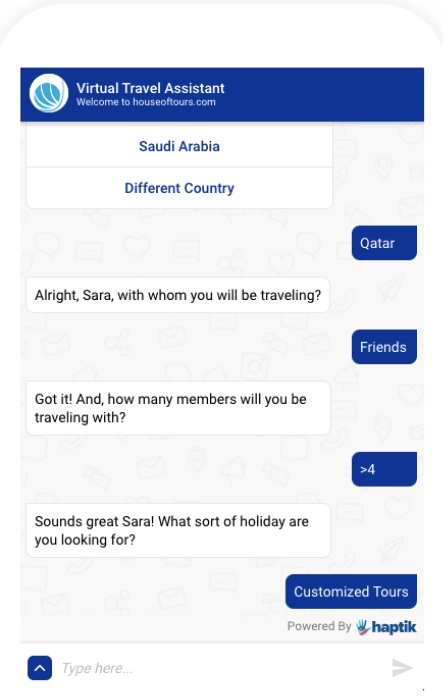
2. Checking visa eligibility
Some citizens must obtain a visa in order to travel to specific nations. But visa refusal is a frequent occurrence. For instance, over 15% of visa requests in 2021 were rejected by Schengen countries.3 Visa denial might ruin your clients’ travel plans, result in financial losses (non-refundable prepayment ), and lower customer satisfaction.
Chatbots can be used by hospitality businesses to check their clients’ eligibility for visas (see Figure 4). Additionally, chatbots provide details about the paperwork consulates require, upcoming visa appointments, and may typically assist consumers through this challenging and perplexing process.
Figure 4: Chatbot helps customers to have a visa.
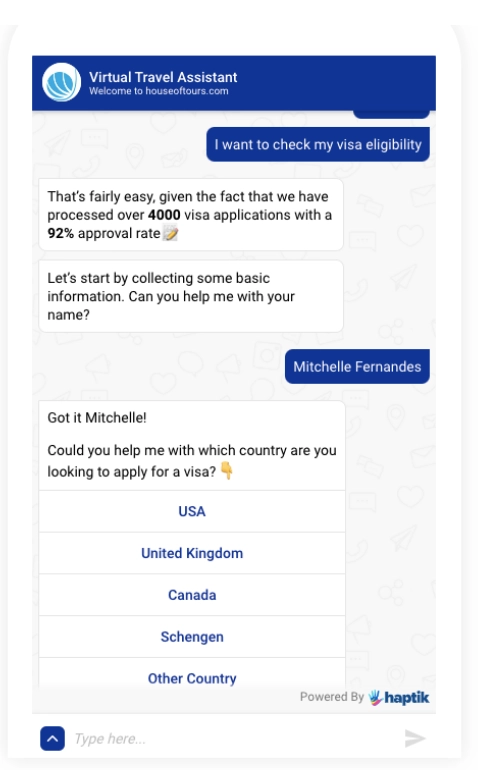
3. Making hotel reservations
Hotel chatbots can browse possible rooms and book a suitable one for the clients. Via various communication channels (such as WhatsApp, Facebook Messenger, and mobile apps) Users can inform chatbots about their destination and travel dates as well as specific criteria such as:
- Non-smoking rooms
- Budget constraint
- The number of people that will stay in the room
- All-inclusivity, etc.
Hospitality chatbots use these criteria to find suitable room options. Then, bots send options to the customer. If customers like any of the options they can proceed with the booking.
For instance, in Figure 5, a client can browse hotels in and near Amsterdam and verify availability at particular times using Oyo’s WhatsApp chatbot.
Figure 5: Oyo’s chatbot browses hotels in Amsterdam.
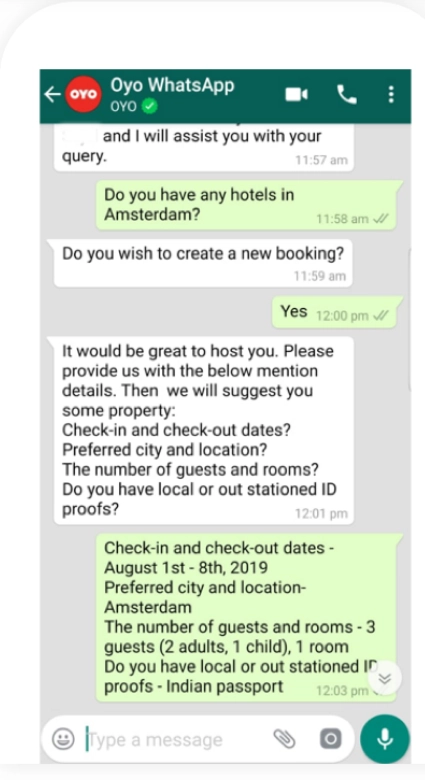
4. Answering FAQs
IBM claims that 75% of customer inquiries are basic, repetitive questions that are quickly answered online. If hotels analyze guest inquiries to identify FAQs, even a rule-based chatbot can considerably assist the customer care department in this area.
No doubt AI-driven chatbots can also handle FAQs for instance, As seen in Figure 6, AI-powered Omar (Equinox hotel’s chatbot) answers frequently asked questions such as the availability of towels in the hotel room.
Figure 6: Equinox Hotel’s chatbot answers FAQs.
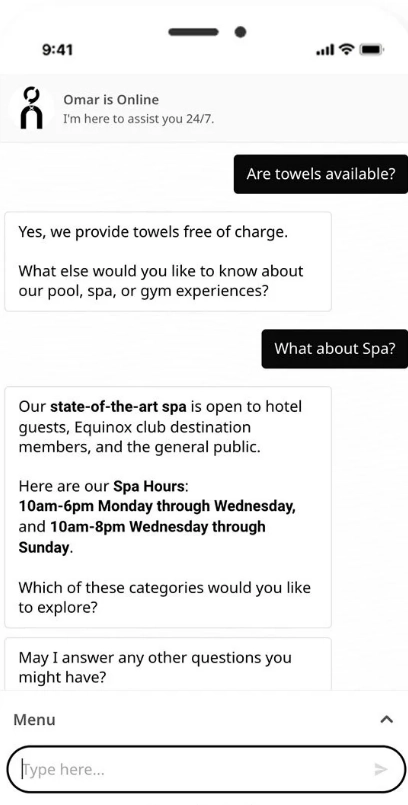
Source: Haptik
5. Sending personalized notifications
It is possible to send personalized notifications such as:
- Payment details.
- Booking details.
- Personalized discounts.
- Delays in the flights.
- Schedule of travel (if it is a business trip).
For such tasks we specifically recommend hotels deploy WhatsApp chatbots since 2 billion people actively use WhatsApp, and firms increase the chance of notification getting seen.
If you wish to have a hotel chatbot but were unable to find a suitable provider, you can read the articles below:
- WhatsApp Business Partners: Everything You Need to Know.
- Conversational Commerce Platforms: Data-driven Benchmarking.
- 50+ Chatbot Companies To Deploy Conversational AI.
You can read our Restaurant Chatbots: Use Cases, Examples & Best Practices article to learn more about restaurant bots.
Finally, if you have further questions about hospitality chatbots you can reach us:
External Links
- 1. “The price premium for getting it right is real—and it’s big“. PwC.
- 2. “Customer Service Excellence 2022”. Deloitte. June 2022.
- 3. “Revealed: These Schengen Countries Have The Highest Visa Rejection Rates”. Atlys. September 2022.

Comments
Your email address will not be published. All fields are required.